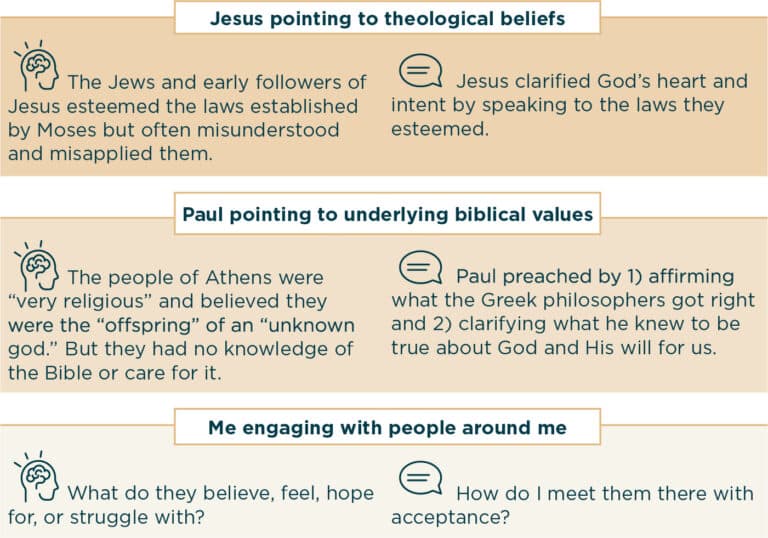5 Tips for Sharing Your Faith at Work
A Christian Leader’s Guide to Spiritual Conversations in the Workplace
As Christian business leaders, we have a biblical mandate to share the gospel with all creation (Mark 16:15) and that includes sharing our faith at work. But how often do we take the opportunity to engage in spiritual conversations in the workplace? While almost 97% of Christians believe that part of their faith means being a witness about Jesus, only 29% of unchurched Americans say that a Christian has ever shared the gospel with them.
If we believe that there is a God who wants a relationship with every person on the planet, then we are compelled to share about His love. According to Nigel Biggar, when we let feelings of fear and inadequacy render us silent, we have “failed in love for [our] neighbors and robbed them of the opportunity to apprehend a real benefit”.
While trends indicate that an increasing number of people are leaving the Church, they are still showing up to work. Data suggests that our greatest opportunity to have spiritual conversations with non-believers may be in the workplace.

Christian business leaders have been given a unique platform to interact with and influence a wide array of people: our employees, their families, our customers, suppliers, vendors, communities, and beyond.
Sharing Your Faith at Work: Knowing Your Audience
Research into the religious attitudes of people today provides insight into the worldviews we will encounter when we start to share our faith at work. For example, Millennials and Generation Zs may be more interested in how faith is relevant to their lives than intellectual reasons for God or facts from history.
Another insight is the increase in the number of people who don’t identify with any religious group. Categorized by Dr. Timothy Keller as “the nones,” these individuals may acknowledge the existence of a higher power, but they typically do not follow any particular religious sect. They may say they are “spiritual but not religious” or have “no religious preference.” When sharing our faith at work with these people, it’s helpful to remember that many will be unfamiliar with the Bible, Jesus, or the gospel story. it is important not to assume even a basic understanding of these concepts.
Because coworkers will have different levels of comfort with spiritual conversations, we must be aware of the unique person to whom we are speaking. Look for natural opportunities and the right timing when sharing your faith at work. To this day, the adage remains true: it is not only about what we say, but how and when we say it.
5 Tips for Sharing Your Faith at Work
The workplace is an environment where relationships between believers and non-believers naturally occur. Christian ethicist and speaker Will Tant says effective evangelism is not only delivering a speech from a stage but also building relationships and having meaningful spiritual conversations. In the workplace, we will likely encounter people with questions and possibly even a noticeable longing for the gospel. Based on best practices from the world’s leading evangelists, Tant suggests five tips for sharing your faith at work.

 Clarify the Entry Point
Clarify the Entry Point
Start by actively listening to understand your co-workers’ points of view with sincere interest. Seek to understand what may be hindering them from considering Christianity. Only then, after truly knowing their views and concerns, can we present compelling, rational responses to their questions. A willingness to listen fosters trust and creates opportunities for deeper and more meaningful conversations about faith.
 Find Common Ground
Find Common Ground
The apostle Paul and Jesus, Himself, were known for adapting their style of evangelism depending on the audience to whom they were speaking. When addressing a Jewish crowd, they would highlight the moral teachings found in the Torah. When addressing a non-religious audience, they would focus on universally-accepted values and ideals. This flexibility allowed them to effectively communicate their message with people who looked at life from different vantage points.

Considering your co-workers’ perspectives is a compassionate and informative step to prepare for spiritual conversations in the workplace.
As an example, many nonreligious Western individuals hold the belief that human equality and human dignity are fundamental. They may not be aware that these values are 1) derived from a Christian worldview that holds that life is precious and 2) fully supported only in Christian morality, a point made by non-Christians and Christians alike. When we highlight a common perspective on points like human equality and other biblical values, we create an opportunity for a meaningful conversation to share our faith at work.
 Be Authentic and Vulnerable
Be Authentic and Vulnerable
Another powerful tool is sharing our personal stories of how we came to faith in Christ. While non-believers may not agree with our views on salvation or the authority of Scripture, they will likely appreciate a sincere account of our experiences. This approach can be particularly effective when reaching out to younger co-workers who value authenticity and vulnerability.
As we prepare to share our faith story with others, remember that our journeys will include many key moments—not just the one moment in which we accepted Jesus. By sharing our personal experiences, and weaving in connection points throughout our stories, we will naturally deepen our relationships with teammates and open up the opportunity for them to share their journeys and struggles with us.
 Speak in Common Language
Speak in Common Language
Be aware of the language we use when speaking about faith. In business, we try to avoid using technical terms or jargon that may be confusing to people outside the business. In the same way, as Christians, it is beneficial to avoid phrases that may be unfamiliar to those outside the faith and may lead to misunderstanding.
Some common terms to avoid include:
Sin
Born Again
Washed by the Blood
Fundamentalist
Saved
Body of Christ
Gospel
Quiet Time
Flesh
Covet
Testimony
The World
Instead of saying “born again” we might say, “starting a new life with Jesus.” We could also substitute phrases such as “washed by the blood” with something like “forgiven because of Christ’s sacrifice.” Using clear and common language can help us communicate our beliefs effectively without causing confusion or alienation. Mutual understanding fosters meaningful conversations.
 Disarm the Conversation
Disarm the Conversation
Focus more on building relationships than winning arguments. When we understand the context of the individual person and conversation, we can adjust our approach, recognizing when to hold back, when to say something gently, and when to contradict more strongly.
As we share our faith at work, it is vital to communicate the truth in a loving manner. In doing so, we create a foundation for deeper and more meaningful spiritual conversations to take place. When we express the truth with compassion, it increases the likelihood of our co-workers considering our perspective.
Sharing Your Faith at Work: Two Examples
Dean Harrington and Rachel Nguyen are both leaders in New England—a place they describe as “dark” because many people in the region do not know Jesus. While the services they offer and the customers they serve are very different, they both felt convicted to have intentional spiritual conversations in the workplace. Watch this video to learn how Harrington and Nguyen established authentic ways to share their faith at work.
In the midst of our everyday business interactions, we will often connect with people who may be struggling, seeking answers, or searching for a sense of purpose. Like Harrington and Nguyen, we can provide a pathway for employees, customers, vendors, and others to consider faith in Christ.
Whether you are a seasoned evangelist or new to sharing your faith, our guide on Ways to Share the Gospel can help you articulate and determine your preferred gospel presentation.
For Such a Time as This

Our time as leaders has a limited shelf life. Throughout the years, employees will come and go. Customers will change. Vendors and suppliers may be critical in some seasons and distant in others. We never know when our opportunity to share our faith with people we care about may be cut short. We must be prepared at all times to give a response for the hope that we have (1 Peter 3:15). Eternal destinies are on the line. Our willingness to take risks matters.
There is hope in knowing that our God is in the business of using imperfect people to execute His perfect plans. We may not have the privilege of seeing someone accept Christ after sharing our faith at work, but perhaps the seed we planted might result in our co-worker accepting Him later in life.
We must approach spiritual conversations in the workplace with sensitivity and compassion, knowing each person has their own journey to finding faith in God. Our businesses can be powerful platforms to take part in His plan of redemption. Because of this, we can share the gospel with anticipation, trusting God to lovingly guide souls toward a meaningful relationship with Him.
At C12, we provide Christian business leaders, CEOs, and business owners with the business tools, peer advisory groups, and executive coaching they need to thrive in business and life. To learn more about C12’s approach to Christ-centered business leadership, find a C12 Business Forum near you.
About the Author
C12 Editorial Team
C12 is the largest peer-learning organization for Christian CEOs, business owners, and executives and a leader in the marketplace ministry movement. Located in over 160 major metro areas across the United States, Brazil, Malaysia, Singapore, Taiwan, and South Africa, C12 serves businesses with 10 to 10,000+ employees and annual revenues ranging from $2 million to $5 billion. C12 Business Forums provides an architected environment for Christian business leaders that integrates work, life, and leadership transformation. Led by full-time C12 Chairs—veterans of business with ownership or C-Suite experience—our CEO and Key Player Forums equip members with resources and tools to steward a BaaM (Business as a Ministry) vision to build great businesses for a greater purpose. For more information, please visit C12 Business Forums.
April 10, 2023


